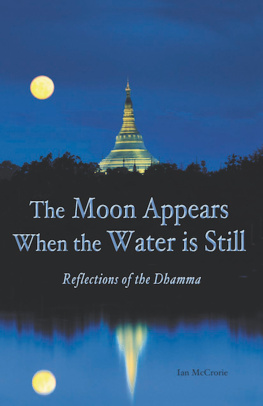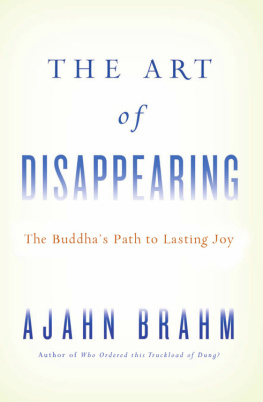The Moon Appears
When the Water Is Still
Reflections of the Dhamma
Ian McCrorie
Pariyatti Press
(an imprint of)
PARIYATTI PUBLISHING
867 LARMON ROAD, ONALASKA, WASHINGTON 98570
WWW.PARIYATTI.ORG
2003 Ian McCrorie
First Edition, 2003
Second printing May, 2003
All Rights reserved. No part of this book may be used or reproduced in any manner whatsoever without prior written permission of Pariyatti Publishing, except in the case of brief quotations embodied in critical articles and reviews.
Print ISBN 978-1-928706-17-5
PDF ISBN 978-1-928706-78-6 (ebook 2011)
ePub ISBN 978-1-928706-79-3
Library of Congress Control Number: 2002117330
Black & white photos by Andre Martel. 2003 Andre Martel
The publishers gratefully acknowledge permission from Dover Publications, New York for use of the Japanese family crests that begin each Reflection. They are from Japanese Design Motifs: 4,260 Illustrations of Heraldic Crests, which is part of the Dover Pictorial Archive Series.
Preface
During more than twenty years of intensive meditation in monasteries, ashrams and retreat centers in India, Southeast Asia, Japan and North America I have sat at the feet of numerous wise and charismatic elders and gurus. I have been inspired, set straight and at times admonished by their Dhamma talks. But it was not the long erudite lectures that cut through my mass of confusion. With my teacher, S.N. Goenka, a master of few words but many anecdotes, the light would go on when he related the right story at the right time. Often times it was but a sentence; a few times not much more than a word.
When he later appointed me to assist him by conducting meditation courses, I found myself resorting to these same allegories and metaphors, cutting to the chase so to speak, to make a pertinent point of the teaching clear to a student. Often, in answer to a students question, I would say It is as if not quite knowing with what metaphor, with what allegory or aphorism I would complete the sentence but trusting in the Dhamma to help. And sometimes I would hear later that whatever I had said had indeed dissolved the thick morass of confusion, just as similar allegories had done for me in years past.
So this little book is an offering of those stories, anecdotes and aphorisms that were an inspiration to me and to others. May they be so to you as well. Whatever truths are contained herein are of help when read or recalled at the time when they are most needed. I make no claim to originality; they are, after all, reflections. If you are thinking of starting a spiritual journey these reflections may inspire you to take that first most important step. If you are a seasoned practitioner they may see you through those times when the mind seems to get mired in the mud of doubts and confusion. And I make no claim that these reflections are factual; only that they mirror the teachings of the Buddha. A wise man once said that a story doesnt have to be factual to be true.
Another equally wise man warned us not to mistake the finger for the moon. We need the finger to point the direction and we may be forever grateful for its clear guidance, but, after all it is only a finger; it is not the moon. These reflections point to the Dhamma, they allude to the truth, but the truth itself cannot be captured in words. It can only be experienced. The words are mere Reflections of the Dhamma.
The Moon Appears
When the Water Is Still
Reflections of the Dhamma
For my wife, Hyesun
Sitting does not create truth,
meditation does not produce insight,
just as smelling a flower
does not make it fragrant.
The perfume of the rose is there.
We slow down to attend the unfolding
and flowering of its nature.
Slowing down and attending
to just this breath allows
the reality of Now to reveal its nature.
Sitting still gives us the opportunity
to witness the revealing of the truth.
The moon appears only when the water is still.
We sit through the storms
of pain and anguish.
We push on into the gale force winds
of our own resistance.
We strive to untangle the Gordian knots
of our karmic inheritance
until we faint from exhaustion
and finally give up.
It is only then,
when we see we cant do it,
that some insight
and some peace arises.
For the more we try,
the stronger become our enemies.
The more we sweat and strive
the deeper we sink
into the quicksand of our own craving.
We must make an effortless effort.
We have all the time in the world
but there is not a minute to lose.
To reach the final goal we must run fast
but never be in a hurry.
We cant do it but it can be done.
I am the cause of my own suffering.
Now tis true that the death of a loved one,
poverty, unrequited love, hunger
cause pain.
Pain is woven into the very fabric
of the human condition.
Even the Buddha could not escape pain.
I dislike this pain, I want it to cease,
I feel it is so unfair.
I forever dwell one-problem-removed
from divine bliss!
But still tis I and I alone who causes my suffering
for tis I and I alone who reacts to the inevitable
pain and malaise and discontent
of human life.
Pain visits all
but suffering comes not
to those who welcome its arrival.
We need not fear the arising of thoughts
only fear being too slow to notice them.
Once we take notice of any thought
the mind is then flooded with awareness
which swallows the thought. It can now be seen
for what it was before we reacted to it:
a harmless, simple verbal synapse.
Our job is not to eradicate thoughts
but to desist from reacting to them.
If the non-arising of thoughts is our goal
then rocks are enlightened.

















